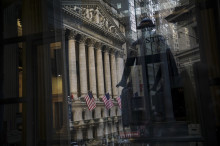Suddenly economic populism is all the rage. In his now famous monologue on Fox News, Tucker Carlson argued that American elites are using ruthless market forces to enrich themselves and immiserate everyone else. On the campaign trail, Bernie Sanders and Elizabeth Warren are telling left-wing versions of the same story.
In an era of tribal emotionalism, you’re always going to be able to make a splash reducing a complex problem to a simple narrative that separates the world into the virtuous us, and the evil them (the bankers). But I’d tell a third story about our current plight, which is neither economic populism nor free-market fundamentalism.
My story begins in the 1970s. The economy was sick. Corporations were bloated. Unions got greedy. Tax rates were too high and regulations were too tight. We needed to restore economic dynamism.
So in 1978, Jimmy Carter signed a tax bill that reduced individual and corporate tax rates. Senator Ted Kennedy led the effort to deregulate the airline and trucking industries. When he came into office, Ronald Reagan took it up another notch.
It basically worked. We’ve had four long economic booms since then. But there was an interesting cultural shift that happened along the way. In a healthy society, people try to balance a whole bunch of different priorities: economic, social, moral, familial. Somehow over the past 40 years economic priorities took the top spot and obliterated everything else. As a matter of policy, we privileged economics and then eventually no longer could even see that there could be other priorities.
For example, there’s been a striking shift in how corporations see themselves. In normal times, corporations serve a lot of stakeholders — customers, employees, the towns in which they are located. But these days corporations see themselves as serving one purpose and one stakeholder — maximizing shareholder value. Activist investors demand that every company ruthlessly cut the cost of its employees and ruthlessly screw its hometown if it will raise the short-term stock price. Want more? You can read the full article here


